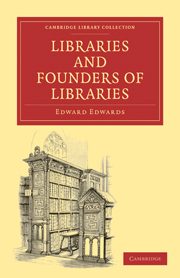Book contents
- Frontmatter
- PREFACE
- Contents
- LIBRARIES, AND THE FOUNDERS OF LIBRARIES
- CHAPTER I INTRODUCTORY.—THE ANCIENT LIBRARIES OF EGYPT, OF JUDÆA, OF GREECE, AND OF THE ROMAN EMPIRE
- CHAPTER II INTRODUCTORY. — MEDIÆVAL AND MODERN LIBRARIES. — ANTICIPATORY SURVEY OF THE SUBJECT, IN GENERAL
- CHAPTER III OF SOME LIBRARIES OF MONASTERIES ABROAD
- CHAPTER IV OF SOME LIBRARIES OF MONASTERIES AT HOME
- CHAPTER V CONCERNING THE LIBRARIES OF SOME FAMOUS AUTHORS, OF VARIOUS PERIODS
- CHAPTER VI CONCERNING THE LIBRARIES OF SOME CELEBRATED MONARCHS AND ROYAL PERSONAGES, OF VARIOUS PERIODS
- CHAPTER VII HISTORY OF THE OLD ROYAL LIBRARY OF THE KINGS OF ENGLAND
- CHAPTER VIII HISTORY OF THE STATE PAPER OFFICE
- CHAPTER IX HISTORY OF THE PUBLIC RECORDS OF THE REALM, IN THEIR EARLY PERIOD OF GROWTH AND SEPARATE CUSTODY
- CHAPTER X THE LIFE OF THOMAS PARKER, EARL OF MACCLESFIELD.—THE LIFE OF NICHOLAS JOSEPH FOUCAULT.—HISTORY AND DESCRIPTION OF THE LIBRARY AT SHIRBURN CASTLE IN OXFORDSHIRE
- CHAPTER XI THE LIFE OF CHARLES SPENCER, THIRD EARL OF SUNDERLAND. — HISTORY AND DESCRIPTION OF THE LIBRARY AT BLENHEIM PALACE
- CHAPTER XII THE PUBLIC LIFE OF GEORGE JOHN, SECOND EARL SPENCER.—HISTORY AND DESCRIPTION OF THE SPENCER LIBRARY AT ALTHORP
- APPENDIX A LIST AND DESCRIPTION OF EXTANT CATALOGUES OF ENGLISH MONASTIC LIBRARIES, DISTINGUISHING THE UNPRINTED FROM THE PRINTED
- APPENDIX B NOTE ON THE LIBRARY OF KING EDWARD THE SIXTH
- APPENDIX C SUMMARY CLASSIFICATION AND SYNOPTICAL VIEW OF THE PUBLIC RECORDS OF THE REALM
- Plate section
CHAPTER IV - OF SOME LIBRARIES OF MONASTERIES AT HOME
Published online by Cambridge University Press: 10 November 2010
- Frontmatter
- PREFACE
- Contents
- LIBRARIES, AND THE FOUNDERS OF LIBRARIES
- CHAPTER I INTRODUCTORY.—THE ANCIENT LIBRARIES OF EGYPT, OF JUDÆA, OF GREECE, AND OF THE ROMAN EMPIRE
- CHAPTER II INTRODUCTORY. — MEDIÆVAL AND MODERN LIBRARIES. — ANTICIPATORY SURVEY OF THE SUBJECT, IN GENERAL
- CHAPTER III OF SOME LIBRARIES OF MONASTERIES ABROAD
- CHAPTER IV OF SOME LIBRARIES OF MONASTERIES AT HOME
- CHAPTER V CONCERNING THE LIBRARIES OF SOME FAMOUS AUTHORS, OF VARIOUS PERIODS
- CHAPTER VI CONCERNING THE LIBRARIES OF SOME CELEBRATED MONARCHS AND ROYAL PERSONAGES, OF VARIOUS PERIODS
- CHAPTER VII HISTORY OF THE OLD ROYAL LIBRARY OF THE KINGS OF ENGLAND
- CHAPTER VIII HISTORY OF THE STATE PAPER OFFICE
- CHAPTER IX HISTORY OF THE PUBLIC RECORDS OF THE REALM, IN THEIR EARLY PERIOD OF GROWTH AND SEPARATE CUSTODY
- CHAPTER X THE LIFE OF THOMAS PARKER, EARL OF MACCLESFIELD.—THE LIFE OF NICHOLAS JOSEPH FOUCAULT.—HISTORY AND DESCRIPTION OF THE LIBRARY AT SHIRBURN CASTLE IN OXFORDSHIRE
- CHAPTER XI THE LIFE OF CHARLES SPENCER, THIRD EARL OF SUNDERLAND. — HISTORY AND DESCRIPTION OF THE LIBRARY AT BLENHEIM PALACE
- CHAPTER XII THE PUBLIC LIFE OF GEORGE JOHN, SECOND EARL SPENCER.—HISTORY AND DESCRIPTION OF THE SPENCER LIBRARY AT ALTHORP
- APPENDIX A LIST AND DESCRIPTION OF EXTANT CATALOGUES OF ENGLISH MONASTIC LIBRARIES, DISTINGUISHING THE UNPRINTED FROM THE PRINTED
- APPENDIX B NOTE ON THE LIBRARY OF KING EDWARD THE SIXTH
- APPENDIX C SUMMARY CLASSIFICATION AND SYNOPTICAL VIEW OF THE PUBLIC RECORDS OF THE REALM
- Plate section
Summary
Here, then, I cannot choose but bitterly exclaime
Against those fools that all Antiquity defame,
Because they have found out some credulous ages laid
Some fictions with the truth, whilst Truth or Rumour staid;
And that one forward time (perceiving the neglect
A former of her had), to purchase her Respect,
With toys so trimm'd her up, the drowsy world t'allure
And lent her what it thought might appetite procure
To man, whose mind doth still variety pursue;
And therefore to those things whose grounds were very true,
Though naked yet and bare (not having to content
The wayward curious ear), gave fictive ornament:
And fitter thought, the truth they should in question call,
Than coldly sparing that, the truth should go and all.
Poly-olbion.The traveller who looks at the few and slight fragments of monastic architecture yet to be seen at Canterbury, has before him—as is well known, nowadays, to almost every traveller—the little that is left of the earliest seat of Christianity in England, about which our information is distinctly historical, and plainly separable from mere tradition. Such travellers, too, as care about the history of collections of books, will have some pleasure in the thought that they are also looking upon the site of England's first known Library.
That infant and tiny collection of the Holy Scriptures and of two or three books of Theology, came from St. Gregory, and with St. Augustine. Towards the close of the seventh century, Theodore of Tarsus, it is recorded, added a large number of books to the small foundation of Augustine.
- Type
- Chapter
- Information
- Libraries and Founders of Libraries , pp. 53 - 58Publisher: Cambridge University PressPrint publication year: 2010

